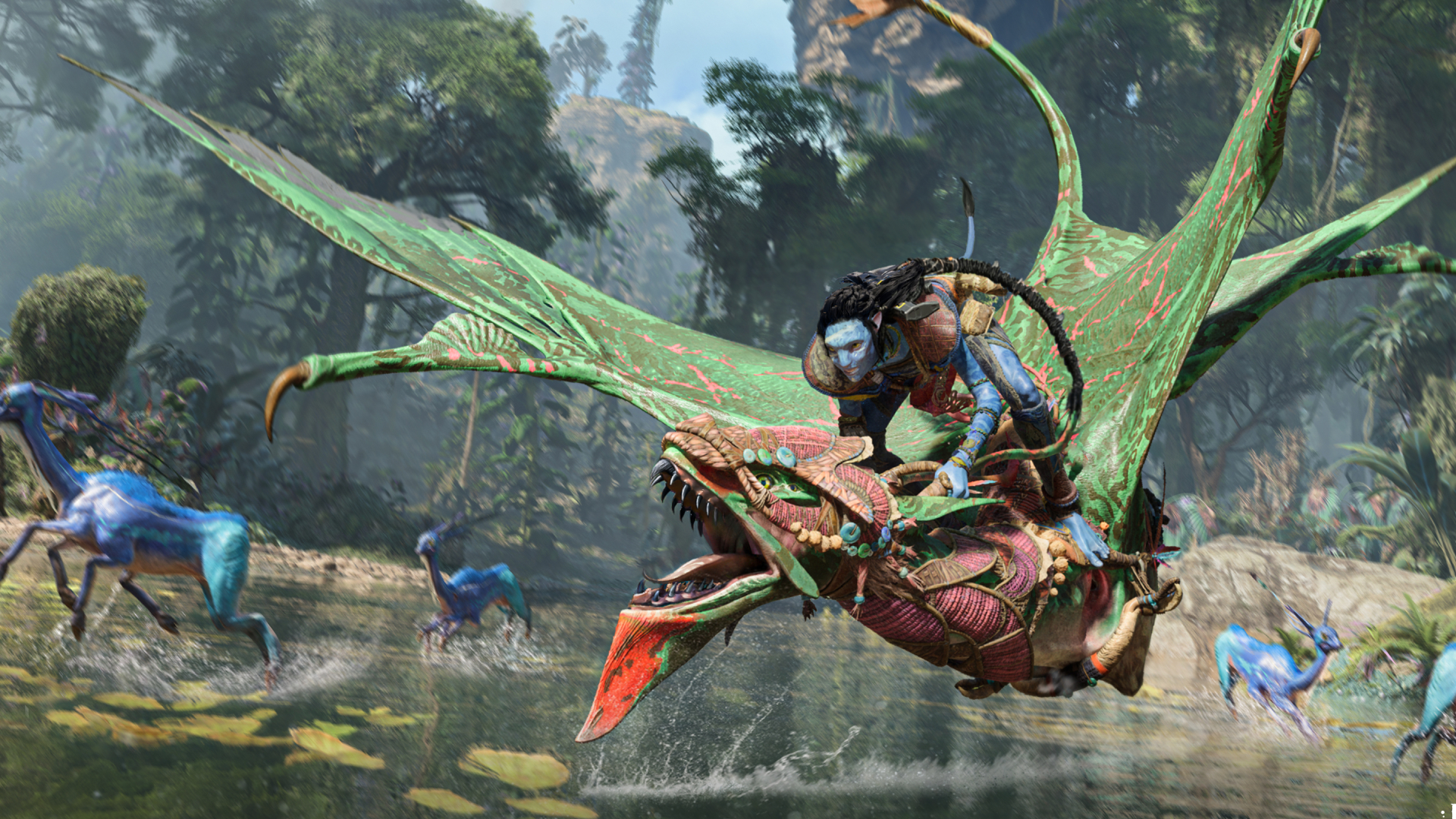
What is it? A Far Cry-like set in the world of James Cameron's Avatar
Release date December 6, 2023
Expect to pay $60/£50
Developer Massive Entertainment, Ubisoft Shanghai, Ubisoft Düsseldorf
Publisher Ubisoft
Reviewed on Radeon RX 6600, Ryzen 7 7700x, 32GB DDR5 RAM
Steam Deck TBA
Link Official site
Avatar: Frontiers of Pandora transcends its progenitor series Far Cry with an awe-inspiring presentation, a captivating world, and tense combat, but at present, it's buried under a mountain of technical trouble, and it could take months to unearth a genuinely great game with patches and driver support.
When it's working, navigating Pandora is a total joy: sprinting at mach five across the forest floor and parkouring across the serpentine tree roots that connect dense jungle brush to rock formations suspended in zero gravity. Avatar's psychedelic "Ecco the Dolphin color palette meets Starship Troopers industrial sci-fi" look is translated beautifully from film to game, and the skyboxes especially are some of the best I've ever seen. The sheer density and variety of reactive flora and fauna is stunning.
The audio is also a standout, with a score that dynamically shifts from ambient strings that accent the natural sounds of Pandora to pulsating drums and droning synths during combat. It's a soundscape that I expect will see a lot of success outside the game as it's already one of the most diverse and interesting ASMR sound palettes I've ever heard. When I say I intend to use Frontiers of Pandora to put me to sleep, I mean that in the best way possible.
Failure to launch
For me, the gorgeous presentation has been substantially undercut by technical issues that accompany big multi-platform releases—frequent hitching, FPS drops (AMD Adrenaline says I'm getting 90, but it looks and feels a lot more like 45), and blurry FSR3 scaling, which Ubisoft originally attributed to a lack of a day one driver update. That driver update has come, though, and the issues haven't subsided.
My time with Avatar has been consistently impeded by a frustratingly common suite of game breaking bugs and performance issues: We're talking full on system crashes, consistently poor performance, and bizarre progress-erasing interface bugs (namely a perpetually grayed out "continue" button that only works when the game is deleted and subsequently reinstalled). For these reasons, getting sufficiently immersed in Frontiers of Pandora is extremely difficult. It's been my experience that post-launch, these issues have gotten worse, not better, even when using some of the flagship AMD hardware advertised in partnership with the game.
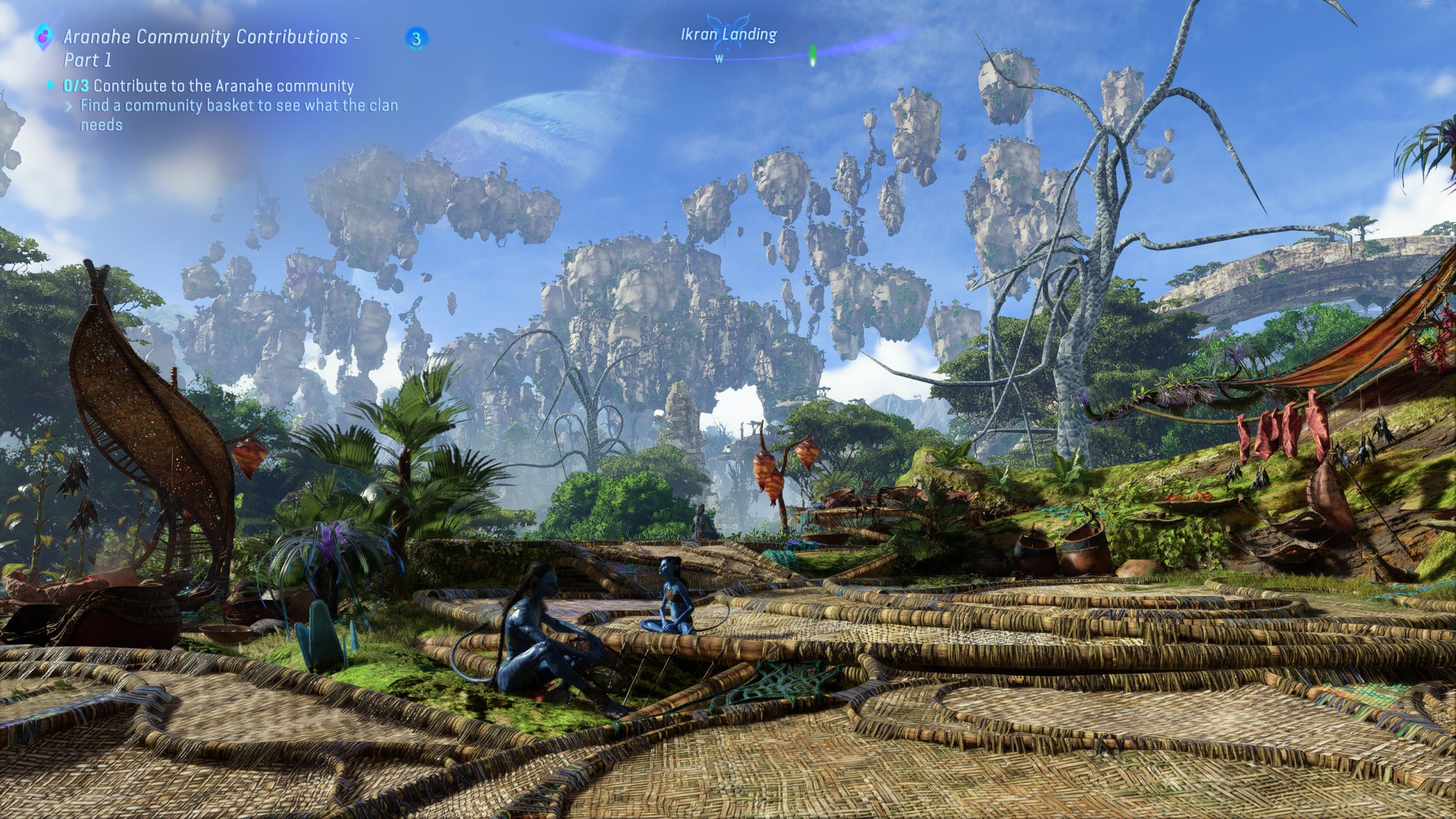
Faulty FSR3 implementation seems to be the culprit behind most crashes, but even with that disabled, walking into a Na'vi hometree or stepping into an area with dense foliage (which scholars will note is 75% of the game) would almost always prompt the same result. For this review, I wasn't even able to spend any time above Pandora's jungles on the back of an Ikran, because getting to one required me to climb a tree that 20 times out of 20 crashed me to the desktop on different hardware, driver, and settings configurations.
Hunting and gathering
My wings (and adulthood!) denied to me, I spent most of my time in Frontiers of Pandora stalking across the lush jungle floor. Resource gathering by means of foraging and hunting is the primary way you source special ammunition and crafting materials for new gear, but Frontiers of Pandora puts an environmentally conscious twist on what would otherwise be a purely extractive (colonial, even) approach to harvesting.
I can't overstate just how much the minimalist user interface and emphasis on exploration is a welcome departure from Ubisoft's traditional approach to open world design.
Killing a deer quickly or gently removing the fruit from a tree will yield higher quality resources, which can be donated to the communal baskets at the various Na'vi clan hometrees in exchange for rare materials and unique rewards. I did roll my eyes when I took down a Sturmbeast (imagine a six legged dinosaur buffalo) for the first time and my Na'vi said a short prayer to Eywa, thanking her for sharing her gifts—I get what it's going for, but attaching these traditional Indigenous harvesting practices to the borderline ecocidal Far Cry hunting system comes off as ridiculous, especially when you say a solemn prayer after punching a dog in the back of the head eight times.
I can't overstate just how much the minimalist user interface and emphasis on exploration is a welcome departure from Ubisoft's traditional approach to open world design. Objective markers only show up when you engage Na'vi senses (detective vision), which has made my time on Pandora a mostly peaceful one, occasionally punctuated by intense combat with RAD patrols. There's still a bevy of side missions and objectives and collectibles and all the usual open world junk here, but not having a constant reminder of just how much bullshit there is to still do makes Frontiers of Pandora feel a lot more chill.
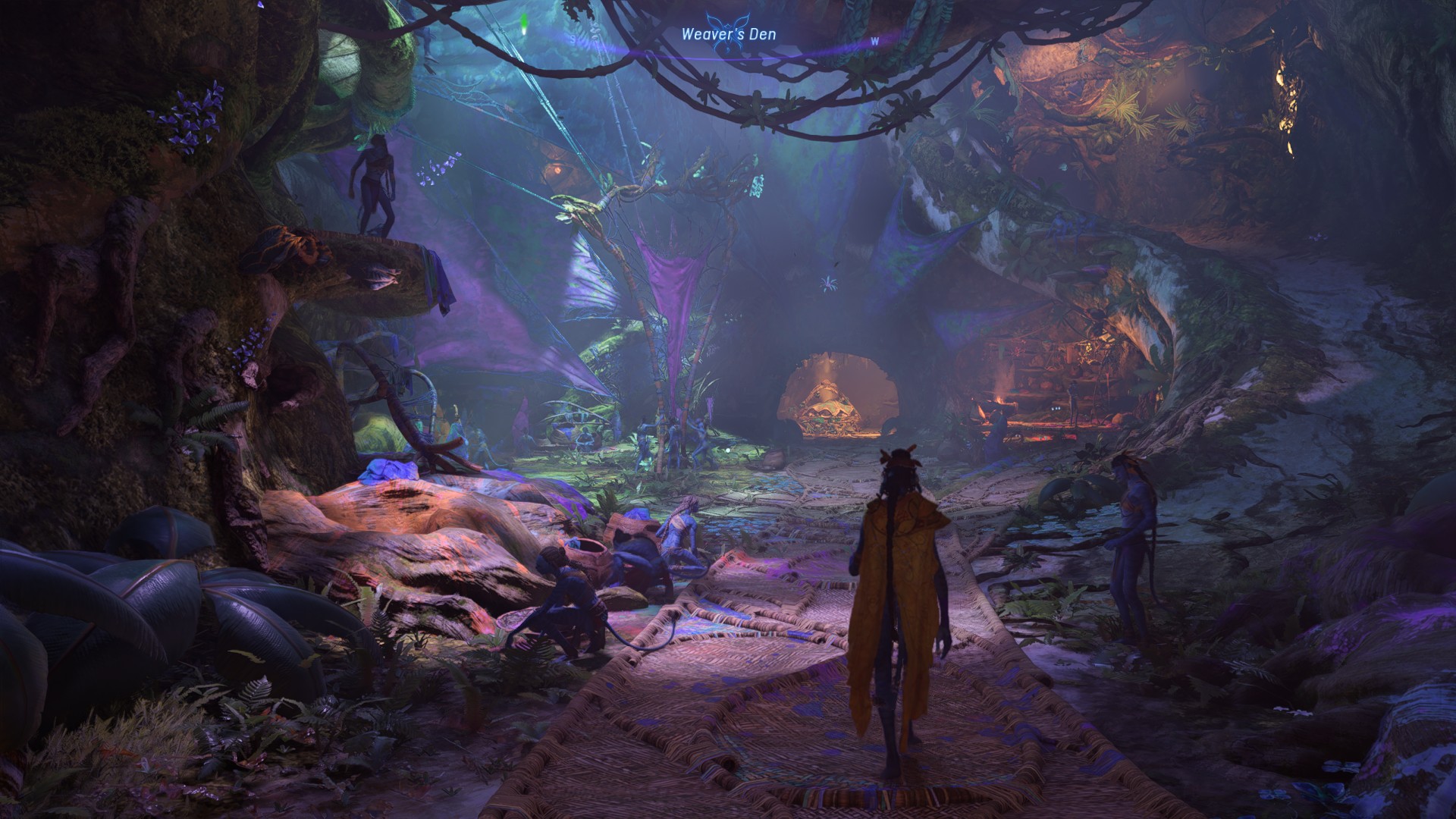
Your arsenal is a blend of Na'vi and human weaponry: longbows and bigger, heavier longbows, lacrosse sticks that lob grenades and poison traps, as well as assault rifles and shotguns. It's a melting pot of weapons that each fill an enjoyable niche in Frontiers of Pandora's combat sandbox. Archery in general just feels fantastic—the distance your Na'vi holds the bow from their chest, the sound of the wood straining as you pull back on the string—impaling some company footsoldier with an arrow that feels like it was shot out of a railgun truly did not get old.
It's a bit trite to say "it makes you feel like a Na'vi!", but Frontiers of Pandora consistently emphasizes just how different Na'vi physiology is, and the abilities and maneuvers it adds to the Ubisoft Far Cry formula are great, the best being a charge and double jump (abilities which are, of course, passed down to you by your ancestors in an eye-roll-inducing cutscene).
Always beautiful, often thoughtless
Remember the mech suits from the first movie? Those are most of what you'll be fighting across Pandora, though they'll occasionally be supported by light infantry and air support. They're total pushovers if you can isolate one, but having to deal with even two at once was enough to get me to start thinking about combat strategically.
There was a great moment early on where I had to face down five mech suits that had me quickly switching between weapons a la Doom Eternal—lobbing grenades to knock them off balance, cracking their dumb Ford F-150 windshields with arrows, and then spraying down the pilot with a quick burst from my AR.
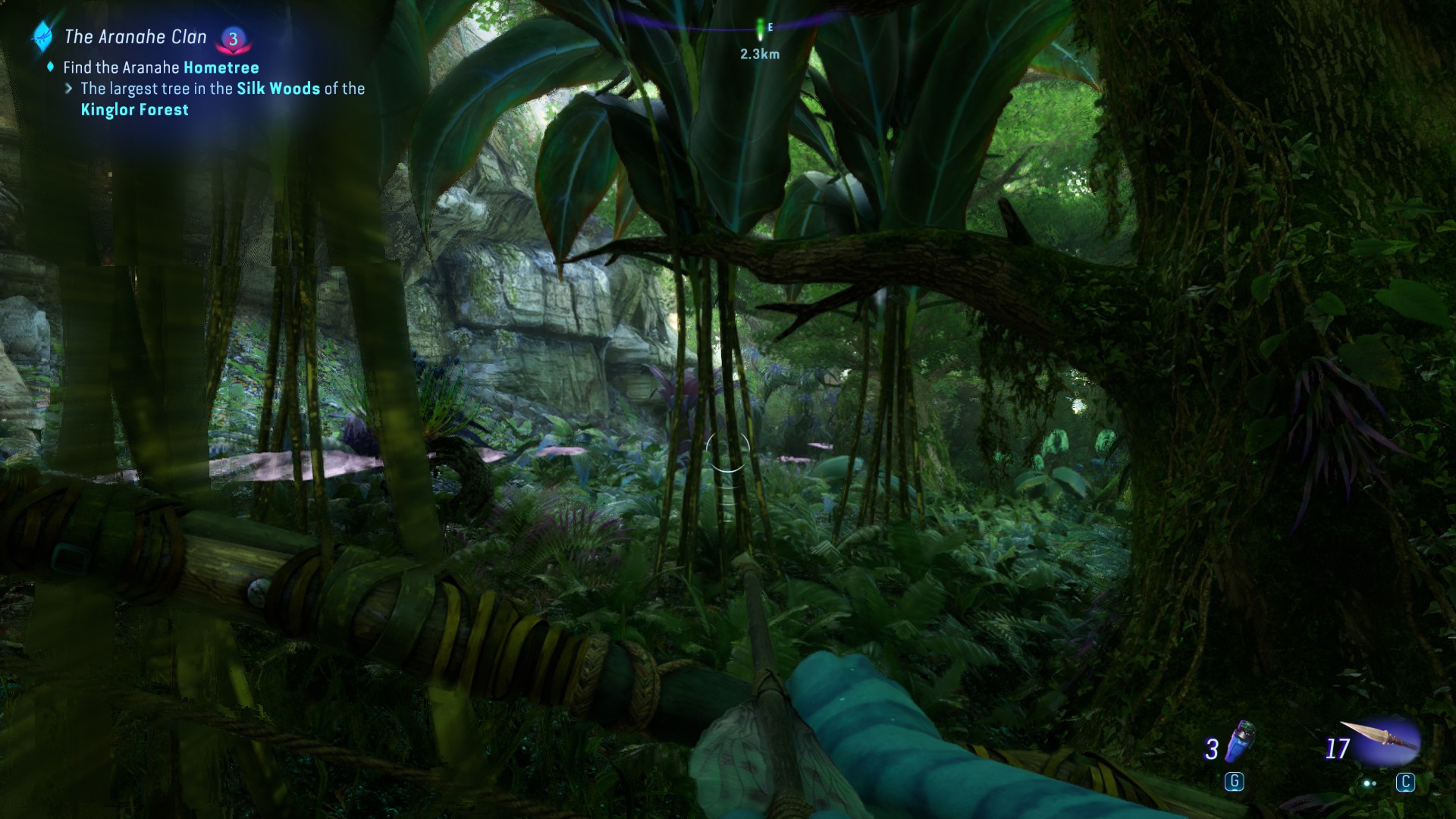
While fun to pincushion with arrows, I can't help but feel that the invading Resources Development Administration, which in the films is a modern day mining company run by a neoconservative Judge Holden, has had all its edge sanded off. Its unflinching brutality is only ever alluded to with Na'vi occasionally mentioning they've gotten word of "village massacres," a shallow parallel to the Mai Lai massacre that's at odds with the setting. In Frontiers of Pandora, the RDA is so bereft of their characteristic imperialist brain rot that it's easy to forget that they got kicked off Pandora after a failed "shock and awe" military operation designed to "blast a hole in the Na'vi racial memory." It's satisfying to see these guys get murdered by tie-dye colored dragons precisely because they are Glanton gang members with MBAs. Without the confidence to draw meaningful parallels between the RDA and both modern and historical imperialism, Frontiers of Pandora reduces some of modern sci-fi's best villains to mall security guards in powerloaders.
Frontiers of Pandora is shackled to a jarring, awkwardly written, and tone-deaf narrative.
It's not just some weak antagonists: Frontiers of Pandora is shackled to a jarring, awkwardly written, and tone-deaf narrative. At the first human resistance base, your Na'vi character will be subjected to endless inane babbling—there's constant gawking and cracks about the differences between human and Na'vi physiology, and without the option to push back, it comes off as a thoughtless backing track of nonstop microaggressions that will likely be uncomfortably familiar to any Indigenous person. Worst of all is a nuclear-weapon level title drop which identifies the Na'vi ambassador program that your character is raised in as a "Residential School." That label is totally misapplied, and Frontiers of Pandora doesn't capture the extreme range of abuse present at these "schools'' with its depiction. It's a tasteless and irresponsible comparison, made all the more jarring in a series that generally succeeds in honest portrayals of imperialism and colonialism.
The issue of cultural appropriation and impropriety in the context of Avatar is needly—for what's it worth, I'm Indigenous and have been ride or die for these movies since the first one came out in 2009. Ultimately, Frontiers of Pandora's stiffly delivered dialogue is way out of step with both films, and the need to undercut everything with a smarmy joke consistently fails to portray some of the most interesting aspects of both human and Na'vi culture.
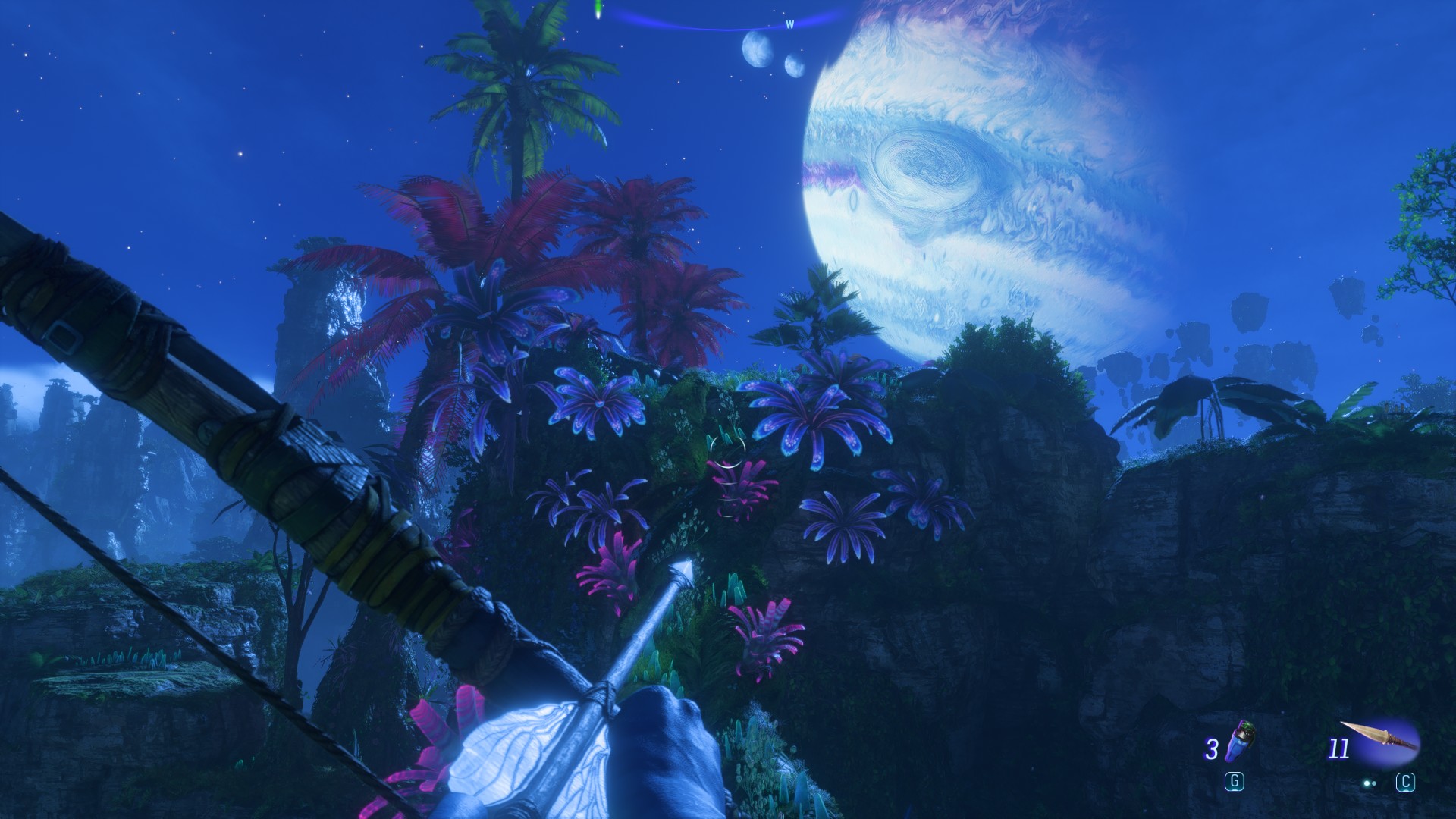
A point from the first film that I've always appreciated is how the Na'vi see industrial society as a type of mass insanity, an idea that Frontiers of Pandora has left unexplored. Frontiers of Pandora hasn't added anything to Cameron's world, and I've even noticed a few things that conflict with the film: remember the big "Dragon" gunship? There's a few of those in Frontiers of Pandora despite that being a rare, one-off military surplus vehicle. Combined with a poor handling of sensitive subjects and an overly sardonic tone, I felt like I was constantly getting pulled out of a setting I have a deep fondness for.
Though the narrative that Ubisoft has crafted to stand alongside Cameron's is at best baffling and at worst offensive, the consistently engaging and immersive environment feels like a massive step forward from a publisher whose open world offerings often seem intent on wasting your time. That world, impressive as it is, is undercut by inexcusable performance and atrocious stability on my PC.
Your experience may differ: One person at PC Gamer who's using a GeForce RTX 2080 Super says that the game has run fine for him on mostly medium settings with DLSS enabled, with only one crash so far. I'm not the only one experiencing frequent crashes, though: other players have reported the same on different hardware configs. I hope that in time these issues will be rectified, but for now, Avatar: Frontiers of Pandora just isn't worth the technical headaches.







